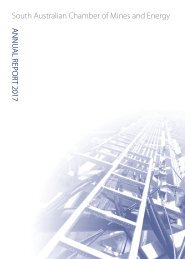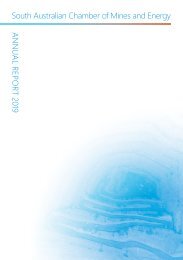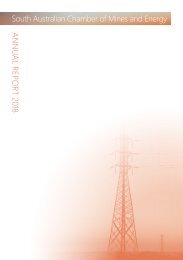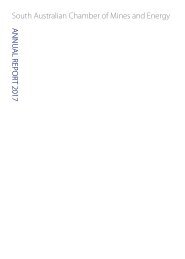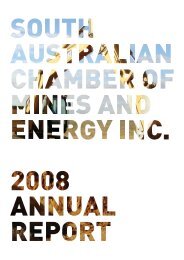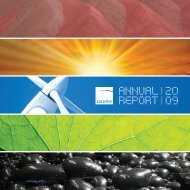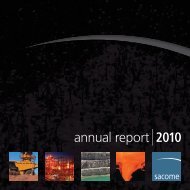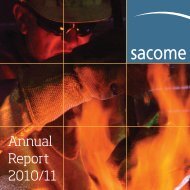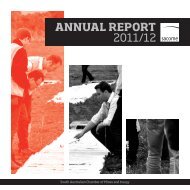SACOME Priorities: State Election 2018
You also want an ePaper? Increase the reach of your titles
YUMPU automatically turns print PDFs into web optimized ePapers that Google loves.
<strong>SACOME</strong> PRIORITIES:<br />
STATE ELECTION <strong>2018</strong><br />
South Australian Chamber of Mines & Energy<br />
Mines & Energy House<br />
290 Glen Osmond Road<br />
Fullarton SA 5063<br />
+61 8 8202 9999<br />
<strong>SACOME</strong> <strong>2018</strong> <strong>Election</strong> Charter sacome@sacome.org.au 1<br />
www.sacome.org.au
Contents<br />
1. <strong>SACOME</strong> Policy Recommendations ................................................................................. 3<br />
1.1 <strong>State</strong> Economic Development ........................................................................................................... 3<br />
1.2 Infrastructure ........................................................................................................................................... 4<br />
1.3 Energy ........................................................................................................................................................ 5<br />
1.4 Legislation & Regulation .................................................................................................................... 6<br />
Economic Contribution of the South Australian Resources Sector ..................................... 7<br />
2. <strong>SACOME</strong> <strong>2018</strong> South Australian <strong>Election</strong> Policy Agenda .............................................. 8<br />
3. <strong>State</strong> Economic Development.......................................................................................... 9<br />
3.1 Policy Discussion .................................................................................................................................... 9<br />
3.2 <strong>State</strong> Economic Development Policy Recommendations: ................................................... 10<br />
3.2.1 Rejection of Resources Moratoria ............................................................................................... 10<br />
3.2.2 Greater access to the Woomera Prohibited Area ................................................................. 10<br />
3.2.3 Increased PACE Minerals Funding .............................................................................................. 10<br />
4. Infrastructure .................................................................................................................. 11<br />
4.1 Policy Discussion ................................................................................................................................. 11<br />
4.2 Infrastructure Policy Recommendations .................................................................................... 12<br />
4.2.1 Duplication of the Joy Baluch Bridge, Port Augusta ............................................................ 12<br />
4.2.2 Regional Port Infrastructure .......................................................................................................... 12<br />
4.2.3 Electricity Transmission Infrastructure ....................................................................................... 12<br />
5. Energy .............................................................................................................................. 13<br />
5.1 Policy Discussion ................................................................................................................................. 13<br />
5.2 Energy Policy Recommendations ................................................................................................. 14<br />
5.2.1 Nationally Cohesive Energy Policy .............................................................................................. 14<br />
5.2.2 Electricity Storage .............................................................................................................................. 14<br />
5.2.3 Ensuring Gas Supply ......................................................................................................................... 14<br />
6. Legislation & Regulation................................................................................................ 15<br />
6.1 Policy Discussion ................................................................................................................................. 15<br />
6.2 Legislation & Regulation Policy Recommendations ............................................................. 16<br />
6.2.1 Completion of the Leading Practice Mining Acts Review Process ................................. 16<br />
6.2.2 Land Access Arrangements ........................................................................................................... 16<br />
6.2.3 Completion of EPBC Bi-lateral Agreements ............................................................................ 16<br />
<strong>SACOME</strong> <strong>Priorities</strong>: <strong>State</strong> <strong>Election</strong> <strong>2018</strong> 2
1. <strong>SACOME</strong> Policy Recommendations<br />
1.1 <strong>State</strong> Economic Development<br />
Rejection of Resources Moratoria - Reject all moratoria on resources exploration and<br />
development in South Australia.<br />
<strong>SACOME</strong> opposes resources moratoria and calls for all South Australian political parties and<br />
independents to reject their use.<br />
Greater access to the Woomera Prohibited Area - Increase economic development<br />
opportunities for the <strong>State</strong> through improved Woomera Prohibited Areas access arrangements.<br />
<strong>SACOME</strong> calls for increased access to the WPA and for the South Australian Government to<br />
support increased exploration and improved access arrangements as part of the <strong>2018</strong> WPA<br />
Review process.<br />
Increased PACE Minerals Funding - Increase PACE Minerals funding to incentivise ongoing<br />
mineral exploration in South Australia.<br />
<strong>SACOME</strong> calls for increased PACE Minerals funding.<br />
<strong>SACOME</strong> <strong>Priorities</strong>: <strong>State</strong> <strong>Election</strong> <strong>2018</strong> 3
1.2 Infrastructure<br />
Duplication of the Joy Baluch Bridge, Port Augusta - Create economic efficiencies for the<br />
resources, agricultural and freight sectors through duplication of the Joy Baluch Bridge and<br />
increased vehicle flow.<br />
<strong>SACOME</strong> welcomes the South Australian Government’s funding commitment of $40m (of the<br />
total $200m cost) for duplication of the Joy Baluch Bridge, and calls for support of this<br />
commitment from all political stakeholders.<br />
In addition, <strong>SACOME</strong> calls for a commitment from all South Australian political stakeholders<br />
to pursue Commonwealth co-funding for this project.<br />
Regional Port Infrastructure - Facilitate the development of critical port infrastructure,<br />
including development of deep water ‘capesize’ port, to increase South Australian export capacity<br />
and drive efficiency across the resources supply chain.<br />
<strong>SACOME</strong> calls for all political stakeholders to implement regulatory, funding and other<br />
necessary approvals that will enable the prompt development of port infrastructure projects.<br />
Electricity Transmission Infrastructure - Facilitate the development of electricity transmission<br />
infrastructure to enable South Australian resources projects.<br />
<strong>SACOME</strong> calls for investment in electricity transmission infrastructure for resources provinces<br />
in the Far North and on the Eyre Peninsula to enable the development of existing and future<br />
projects.<br />
<strong>SACOME</strong> <strong>Priorities</strong>: <strong>State</strong> <strong>Election</strong> <strong>2018</strong> 4
1.3 Energy<br />
Nationally Cohesive Energy Policy - Greater collaboration between Federal and <strong>State</strong><br />
governments to develop nationally cohesive energy policies.<br />
<strong>SACOME</strong> calls for Federal and <strong>State</strong> leaders to work together to develop nationally cohesive<br />
energy policy that facilitates the supply of affordable, secure and reliable energy.<br />
Electricity Storage Options - Ensure continued investment in electricity storage options that<br />
improve reliability of the South Australian electricity network.<br />
<strong>SACOME</strong> calls for all political stakeholders to support continued investment in electricity<br />
storage options that will improve the reliability and operation of variable renewable energy<br />
generation and supply of electricity in South Australia.<br />
Ensuring Gas Supply - Ensure an ongoing supply of affordable gas for South Australian<br />
industrial, commercial and domestic users.<br />
<strong>SACOME</strong> calls for all political stakeholders to support development of conventional and<br />
unconventional gas projects in South Australia.<br />
<strong>SACOME</strong> <strong>Priorities</strong>: <strong>State</strong> <strong>Election</strong> <strong>2018</strong> 5
1.4 Legislation & Regulation<br />
Completion of the Leading Practice Mining Acts Review Process - Ensure the regulatory<br />
structures governing the resources sector are efficient, reflective of industry practices and<br />
facilitate industry activity through completion of the South Australian Leading Practice Mining<br />
Acts Review process.<br />
<strong>SACOME</strong> calls for all political stakeholders to commit to completion of the Leading Practice<br />
Mining Acts Review process following the <strong>2018</strong> <strong>State</strong> <strong>Election</strong>.<br />
Land Access Arrangements - Ensure that processes governing land access arrangements in<br />
South Australia are transparent, evidence-based and strike a balance between land holder rights<br />
and land access for the resources sector.<br />
<strong>SACOME</strong> calls for a commitment by all political stakeholders to enable land access<br />
opportunities for the resources sector while appropriately balancing native title,<br />
compensation, environmental, heritage and other relevant concerns.<br />
Completion of EPBC Bilateral Agreements - Commit to the completion of EPBC Bilateral<br />
Agreement processes.<br />
<strong>SACOME</strong> calls for the completion of EPBC Bilateral agreements between the South Australian<br />
and Commonwealth Governments to streamline environmental approvals under the EPBC Act.<br />
<strong>SACOME</strong> <strong>Priorities</strong>: <strong>State</strong> <strong>Election</strong> <strong>2018</strong> 6
Economic Contribution of the South Australian<br />
Resources Sector<br />
Source: South Australian Resources Information Gateway (SARIG) 2016<br />
<strong>SACOME</strong> <strong>Priorities</strong>: <strong>State</strong> <strong>Election</strong> <strong>2018</strong> 7
2. <strong>SACOME</strong> <strong>2018</strong> South Australian <strong>Election</strong> Policy Agenda<br />
The South Australian Chamber of Mines<br />
and Energy (<strong>SACOME</strong>) is the leading<br />
industry body representing companies with<br />
interests in the South Australian minerals,<br />
energy, extractive, oil and gas sectors; and<br />
the companies who provide support<br />
services to these sectors.<br />
<strong>SACOME</strong>’s membership comprises<br />
companies across the exploration,<br />
extractives, mining, petroleum, service<br />
provision and allied sectors.<br />
<strong>SACOME</strong>’s policy agenda is guided by the<br />
principle that, as the leading industry body<br />
for the South Australian resources sector,<br />
we create an environment that is conducive<br />
to the development of the sector while<br />
ensuring that industry activity is governed<br />
by effective regulatory structures and<br />
transparent environmental controls.<br />
The resources sector is steadily recovering<br />
from a period of downturn and, as the<br />
green shoots of recovery emerge, South<br />
Australia is seeing investment in major<br />
commodity projects which will materially<br />
contribute to the wealth of our <strong>State</strong>.<br />
and makes funding decisions that will<br />
enable the development of resource sector<br />
projects and drive much-needed<br />
efficiencies for operators.<br />
This document is informed by <strong>SACOME</strong>’s<br />
professional industry committees, and the<br />
policies set out in this document directly<br />
reflect the priorities of those companies<br />
that represent our members.<br />
These election priorities are set out under<br />
<strong>SACOME</strong>’s four areas of strategic focus;<br />
namely:<br />
<strong>State</strong> Economic Development;<br />
Infrastructure;<br />
Energy; and<br />
Legislation & Regulation.<br />
<strong>SACOME</strong>’s <strong>2018</strong> <strong>Election</strong> Charter seeks to<br />
inform South Australian political<br />
stakeholders of the South Australian<br />
resource sector’s policy priorities ahead of<br />
the next election, and we call for their<br />
adoption by all political parties and<br />
independents.<br />
The next South Australian Government<br />
needs to ensure that it implements policy<br />
<strong>SACOME</strong> <strong>Priorities</strong>: <strong>State</strong> <strong>Election</strong> <strong>2018</strong> 8
3. <strong>State</strong> Economic Development<br />
3.1 Policy Discussion<br />
Prosperous state economic development is<br />
a goal that <strong>SACOME</strong> shares with the<br />
broader South Australian community.<br />
<strong>SACOME</strong> members make a major<br />
contribution to the South Australian<br />
economy through royalties, export<br />
revenues, employment; and the supply of<br />
mineral commodities and oil and gas to<br />
domestic and global supply chains.<br />
<strong>SACOME</strong> calls for policy and funding<br />
outcomes that encourage growth and<br />
investment in the resources sector while<br />
dispelling sovereign risk concerns.<br />
In addition, reducing operational expense,<br />
improving access to land and incentivising<br />
exploration underpin the ongoing<br />
development of resources projects in South<br />
Australia.<br />
South Australia has an abundance of<br />
mineral wealth, however, the <strong>State</strong>’s<br />
challenging geology means extracting<br />
these commodities can be an expensive<br />
and lengthy proposition for operators.<br />
The PACE program has been a cornerstone<br />
of South Australia’s ability to attract<br />
investment in mineral exploration. It is a<br />
demonstrated economic multiplier, having<br />
generated an increase in state mining<br />
revenue of $2.4B for a public expenditure<br />
of about $50M.<br />
Ensuring an ongoing pipeline of<br />
discoveries is important to both the<br />
resources sector and the <strong>State</strong>, and PACE<br />
plays an important role in this regard.<br />
Resources moratoria are an anathema to<br />
state economic development as they<br />
impede the ability of the sector to develop<br />
new supplies, distort markets and drive up<br />
the cost of critical feedstocks like gas with<br />
flow on effects for industrial, commercial<br />
and domestic users.<br />
They act as a disincentive to investment<br />
and represent a simplistic, populist<br />
response to complex issues which require a<br />
considered and nuanced policy response.<br />
Government and industry must continue to<br />
work in partnership to resolve these<br />
challenges if the economic opportunities<br />
arising from major commodity projects are<br />
to be realised.<br />
<strong>SACOME</strong> <strong>Priorities</strong>: <strong>State</strong> <strong>Election</strong> <strong>2018</strong> 9
Calls for resources moratoria are a<br />
continual frustration for our sector as they<br />
dismiss the stringent compliance<br />
obligations required of operators as part of<br />
the approval process for all resources<br />
projects.<br />
In addition, resources moratoria raise<br />
sovereign risk concerns for the sector, and<br />
act as a strong disincentive for investment<br />
in jurisdictions where they have been<br />
adopted.<br />
3.2 <strong>State</strong> Economic<br />
Development Policy<br />
Recommendations:<br />
3.2.2 Greater access to the Woomera<br />
Prohibited Area<br />
Increase economic development<br />
opportunities for the <strong>State</strong> through<br />
improved Woomera Prohibited Areas access<br />
arrangements.<br />
<strong>SACOME</strong> calls for increased access to the<br />
WPA and for the South Australian<br />
Government to support increased<br />
exploration and improved access<br />
arrangements as part of the <strong>2018</strong> WPA<br />
Review process.<br />
3.2.3 Increased PACE Minerals Funding<br />
3.2.1 Rejection of Resources Moratoria<br />
Reject all moratoria on resources<br />
exploration and development in South<br />
Australia.<br />
Increase PACE Minerals funding to<br />
incentivise ongoing mineral exploration in<br />
South Australia.<br />
<strong>SACOME</strong> calls for increased PACE Minerals<br />
funding.<br />
<strong>SACOME</strong> opposes resources moratoria and<br />
calls for all South Australian political parties<br />
and independents to reject their use.<br />
<strong>SACOME</strong> <strong>Priorities</strong>: <strong>State</strong> <strong>Election</strong> <strong>2018</strong> 10
4. Infrastructure<br />
4.1 Policy Discussion<br />
Infrastructure is fundamental to enabling<br />
the growth and productivity of not only the<br />
resources sector, but all sectors that rely on<br />
it.<br />
The extensive scoping work undertaken in<br />
South Australia through initiatives like the<br />
South Australian Regional Mining &<br />
Infrastructure Plan 2014, alongside<br />
business case development for a range of<br />
projects via Infrastructure Australia mean<br />
the infrastructure requirements of the<br />
resources sector are generally well<br />
understood.<br />
This extensive planning must now be<br />
translated into activity.<br />
Resources sector activity overwhelmingly<br />
occurs in regional South Australia, with our<br />
regions contribution around $25.4 billion<br />
to the <strong>State</strong>’s economy, or over one quarter<br />
of Gross <strong>State</strong> Product (GSP).<br />
Investment in regional infrastructure is<br />
investment in economic growth.<br />
Critical regional infrastructure must be<br />
given funding priority if the <strong>State</strong>’s<br />
economic development and job creation<br />
goals are to be realised. In 2017, the South<br />
Australian Government announced a<br />
record $12.1 billion in infrastructure<br />
investment, with the overwhelming<br />
majority of these projects occurring in<br />
metropolitan areas.<br />
<strong>SACOME</strong> calls for a focus on developing<br />
infrastructure projects that will alleviate<br />
bottlenecks and increase economic output<br />
of both the resources sector and the <strong>State</strong>.<br />
Road, rail and port infrastructure is critical<br />
to enabling the efficient transport of goods<br />
along supply chains and maximising export<br />
opportunities for South Australia. Similarly,<br />
electricity transmission infrastructure is<br />
necessary for development of major<br />
resources projects in the Far North and on<br />
the Eyre Peninsula.<br />
Many of <strong>SACOME</strong>’s infrastructure priorities<br />
are shared by other industry sectors and<br />
funding of these projects will yield<br />
economic benefits across multiple<br />
constituencies.<br />
Where responsibility for infrastructure<br />
funding falls across multiple tiers of<br />
government, <strong>SACOME</strong> calls for all parties to<br />
work in collaboration to realise funding<br />
and development outcomes.<br />
<strong>SACOME</strong> <strong>Priorities</strong>: <strong>State</strong> <strong>Election</strong> <strong>2018</strong> 11
4.2 Infrastructure Policy<br />
Recommendations<br />
4.2.1 Duplication of the Joy Baluch<br />
Bridge, Port Augusta<br />
Create economic efficiencies for the<br />
resources, agricultural and freight sectors<br />
through duplication of the Joy Baluch Bridge<br />
and increased vehicle flow.<br />
<strong>SACOME</strong> welcomes the South Australian<br />
Government’s funding commitment of<br />
$40m (of the total $200m cost) for<br />
duplication of the Joy Baluch Bridge, and<br />
calls for support of this commitment from<br />
all political stakeholders.<br />
In addition, <strong>SACOME</strong> calls for a<br />
commitment from all South Australian<br />
political stakeholders to pursue<br />
Commonwealth co-funding for this project.<br />
4.2.2 Regional Port Infrastructure<br />
Facilitate the development of critical port<br />
infrastructure, including development of<br />
deep water ‘capesize’ port, to increase South<br />
Australian export capacity and drive<br />
efficiency across the resources supply chain.<br />
<strong>SACOME</strong> calls for all political stakeholders<br />
to implement regulatory, funding and<br />
other necessary approvals that will enable<br />
the prompt development of port<br />
infrastructure projects.<br />
4.2.3 Electricity Transmission<br />
Infrastructure<br />
Facilitate the development of electricity<br />
transmission infrastructure to enable South<br />
Australian resources projects.<br />
<strong>SACOME</strong> calls for investment in electricity<br />
transmission infrastructure for resources<br />
provinces in the Far North and on the Eyre<br />
Peninsula to enable the development of<br />
existing and future projects.<br />
<strong>SACOME</strong> <strong>Priorities</strong>: <strong>State</strong> <strong>Election</strong> <strong>2018</strong> 12
5. Energy<br />
5.1 Policy Discussion<br />
The South Australian and national energy<br />
markets are undergoing a period of<br />
significant change, affecting the<br />
deliverability and reliability of energy<br />
across the <strong>State</strong> and the nation.<br />
Access to affordable, secure and reliable<br />
sources of energy are vital for the South<br />
Australian resources sector to prosper.<br />
South Australia has the highest penetration<br />
of renewable generation in Australia<br />
(42.2%) and, as such, experiences increased<br />
volatility and higher wholesale and retail<br />
electricity prices.<br />
The retirement of baseload generation in<br />
South Australia has prompted a reduction<br />
of synchronous generation traditionally<br />
responsible for frequency control and<br />
ancilliary services critical to the stability and<br />
reliability of the network.<br />
Integrating measures to improve the<br />
reliability of renewable generation is<br />
fundamental to ensuring reliability of<br />
supply, with electricity storage playing an<br />
important role in this regard.<br />
South Australia faces a unique challenge in<br />
bringing greater reliability of supply to the<br />
South Australian market, and in addressing<br />
the price shocks that occur when<br />
renewable generation is not sufficient to<br />
meet demand.<br />
<strong>SACOME</strong> has been active in addressing this<br />
issue through its Joint Purchasing Electricity<br />
Group.<br />
This <strong>SACOME</strong>-led initiative secured ACCC<br />
authorisation, allowing 22 major electricity<br />
users in South Australia to collectively<br />
negotiate a long-term supply contract<br />
aimed at leveraging this collective<br />
purchasing power to negotiate a more<br />
affordable electricity supply arrangement.<br />
The group’s combined load of 267 MW<br />
constitutes 16% of South Australia’s total<br />
load. The Purchasing Group is also an<br />
exercise in cross-sector collaboration,<br />
comprising members across the mining,<br />
food and wine, agriculture, manufacturing,<br />
retail and tertiary education sectors.<br />
Gas is a critical component of South<br />
Australia’s energy sector and delays or<br />
restrictions to supply and development will<br />
negatively impact gas consumers.<br />
Gas is symbiotically linked with electricity<br />
generation, and gas-fired generation<br />
comprises 50% of South Australia’s<br />
electricity production. A reliable, affordable<br />
supply of gas is essential to ensuring<br />
reliable, affordable electricity generation.<br />
A cohesive national energy policy is<br />
fundamental to ensuring the reliable,<br />
affordable supply of energy to all users.<br />
<strong>SACOME</strong> calls for greater collaboration<br />
between the Commonwealth and all <strong>State</strong>s<br />
<strong>SACOME</strong> <strong>2018</strong> <strong>Election</strong> Charter 13<br />
<strong>SACOME</strong> <strong>Priorities</strong>: <strong>State</strong> <strong>Election</strong> <strong>2018</strong> 13
to develop and implement policy settings<br />
that facilitate the supply of affordable,<br />
reliable energy.<br />
Policies such as the National Energy<br />
Guarantee and Finkel Review<br />
recommendations demonstrate a welcome<br />
shift toward national coordination of<br />
energy policy. <strong>SACOME</strong> submits that such<br />
policies should be technology neutral and<br />
that climate policy targets operating under<br />
such frameworks should operate in line<br />
with international policies incorporating<br />
market-based mechanisms.<br />
5.2 Energy Policy<br />
Recommendations<br />
5.2.2 Electricity Storage<br />
Ensure continued investment in electricity<br />
storage options that improve reliability of<br />
the South Australian electricity network.<br />
<strong>SACOME</strong> calls for all political stakeholders<br />
to support continued investment in<br />
electricity storage options that will improve<br />
the reliability of variable renewable energy<br />
generation and supply of electricity in<br />
South Australia.<br />
5.2.3 Ensuring Gas Supply<br />
Ensure an ongoing supply of affordable gas<br />
for South Australian industrial, commercial<br />
and domestic users.<br />
5.2.1 Nationally Cohesive Energy Policy<br />
Greater collaboration between Federal and<br />
<strong>State</strong> governments to develop nationally<br />
cohesive energy policies.<br />
<strong>SACOME</strong> calls for all political stakeholders<br />
to support development of conventional<br />
and unconventional gas projects in South<br />
Australia.<br />
<strong>SACOME</strong> calls for Federal and <strong>State</strong> leaders<br />
to work together to develop nationally<br />
cohesive energy policy that facilitates the<br />
supply of affordable, reliable energy.<br />
<strong>SACOME</strong> <strong>2018</strong> <strong>Election</strong> Charter 14<br />
<strong>SACOME</strong> <strong>Priorities</strong>: <strong>State</strong> <strong>Election</strong> <strong>2018</strong> 14
6. Legislation & Regulation<br />
6.1 Policy Discussion<br />
The resources sector is subject to extensive<br />
regulatory oversight across all stages of<br />
activity and is one of the most heavily<br />
regulated sectors in Australia.<br />
South Australia benefits from a reputation<br />
as a low-risk investment destination with a<br />
consultative and responsive regulator.<br />
Sound regulatory structures create an<br />
attractive environment within the context<br />
of global competition for resources sector<br />
investment.<br />
The competitive advantage offered by<br />
efficient, balanced regulatory frameworks<br />
cannot be overlooked by political<br />
stakeholders and <strong>SACOME</strong> calls for all<br />
political stakeholders to commit to<br />
ongoing regulatory reform as a matter of<br />
principle.<br />
The Leading Practice Mining Acts Review<br />
process is a necessary step in amending<br />
outdated legislation and creating a<br />
regulatory framework that reflects modern<br />
operational practices and facilitates<br />
industry activity. <strong>SACOME</strong> calls for the<br />
continuation of the review following the<br />
<strong>2018</strong> <strong>State</strong> <strong>Election</strong>.<br />
Similarly, <strong>SACOME</strong> calls for completion of<br />
the Environment Protection Biodiversity &<br />
Conservation (EPBC) bilateral agreement<br />
processes commenced in 2012 and<br />
designed to establish an arrangement<br />
between the Commonwealth and the<br />
South Australian Government to streamline<br />
environmental approvals process under the<br />
EPBC Act. Finalisation of this process would<br />
reduce duplication and timeframes<br />
associated with securing project approval,<br />
with no change to environmental<br />
protection in the Act.<br />
Land access is fundamental to the<br />
operation of the resources sector and<br />
<strong>SACOME</strong> has been engaged in active<br />
consultation with government, the<br />
agricultural sector and traditional owners<br />
as part of the Mining Acts review and the<br />
Stronger Partners, Stronger Futures<br />
initiative.<br />
These discussions have been constructive<br />
and are actively assisting the development<br />
of improved land access arrangements in<br />
South Australia. <strong>SACOME</strong> calls for all<br />
political stakeholders to support and<br />
engage in these discussions.<br />
In addition to these specific examples of<br />
regulatory improvement, <strong>SACOME</strong> calls for<br />
a commitment to ongoing consultation by<br />
government in developing legislative<br />
frameworks that are relevant to industry<br />
practices; and which properly balance the<br />
interests and responsibilities of all<br />
stakeholders.<br />
Government must ensure that the<br />
obligations established by these regulatory<br />
structures do not create unnecessary<br />
administrative burdens or operational<br />
expenses.<br />
<strong>SACOME</strong> <strong>Priorities</strong>: <strong>State</strong> <strong>Election</strong> <strong>2018</strong> 15
<strong>SACOME</strong> calls for South Australian political<br />
stakeholders to commit to best-practice<br />
regulatory frameworks that facilitate<br />
industry activity, encourage investment and<br />
put in place mechanisms that anticipate<br />
and address issues of potential conflict<br />
between the resources sector and the<br />
many other stakeholders it interacts with.<br />
6.2 Legislation & Regulation<br />
Policy Recommendations<br />
<strong>SACOME</strong> calls for a commitment by all<br />
political stakeholders to enable land access<br />
opportunities for the resources sector while<br />
appropriately balancing native title,<br />
compensation, environmental, heritage and<br />
other relevant concerns.<br />
6.2.3 Completion of EPBC Bi-lateral<br />
Agreements<br />
Commit to the completion of EPBC Bilateral<br />
Agreement processes.<br />
6.2.1 Completion of the Leading Practice<br />
Mining Acts Review Process<br />
Ensure the regulatory structures governing<br />
the resources sector are efficient, reflective<br />
of industry practices and facilitate industry<br />
activity through completion of the South<br />
Australian Leading Practice Mining Acts<br />
Review process.<br />
<strong>SACOME</strong> calls for the completion of EPBC<br />
Bilateral agreements between the South<br />
Australian and Commonwealth<br />
Governments to streamline environmental<br />
approvals under the EPBC Act.<br />
<strong>SACOME</strong> calls for all political stakeholders<br />
to commit to completion of the Leading<br />
Practice Mining Acts Review process<br />
following the <strong>2018</strong> <strong>State</strong> <strong>Election</strong>.<br />
6.2.2 Land Access Arrangements<br />
Ensure that processes governing land access<br />
arrangements in South Australia are<br />
transparent, evidence-based and strike a<br />
balance between land holder rights and<br />
land access for the resources sector.<br />
<strong>SACOME</strong> <strong>Priorities</strong>: <strong>State</strong> <strong>Election</strong> <strong>2018</strong> 16





